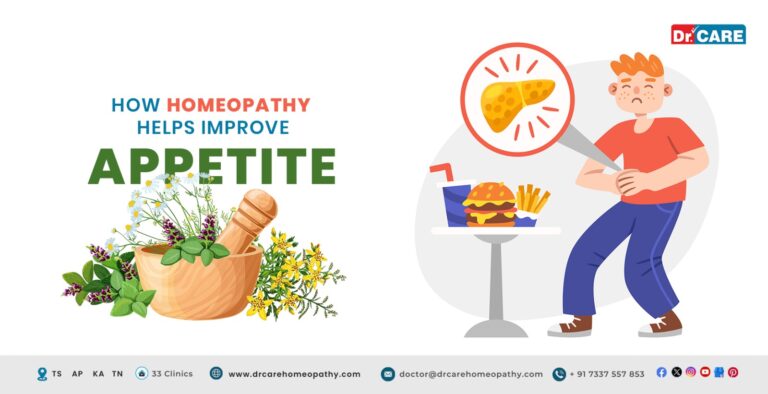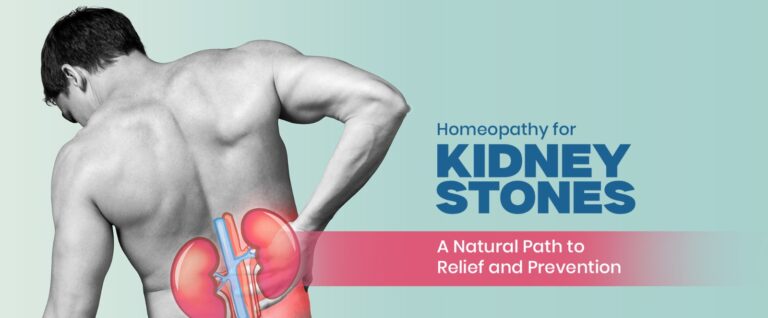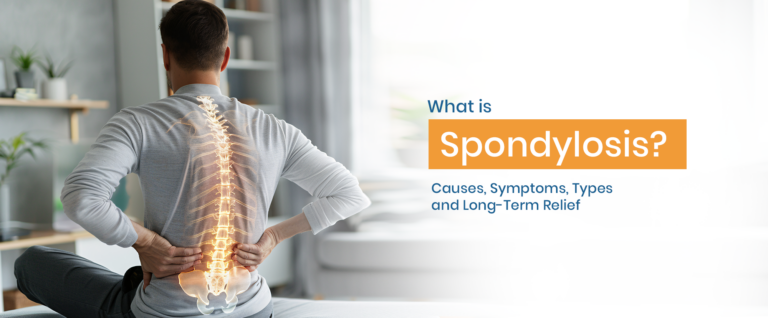Homeopathic Remedies for Poor Appetite and Natural Solutions:
Loss of appetite, medically referred to as anorexia, is a frequent symptom caused by various physical and psychological factors. It’s important to note that this is different from the eating disorder anorexia nervosa. When your appetite decreases, you may find yourself eating less or not at all, which can lead to a loss of weight, fatigue, and even malnutrition if left untreated.
Common triggers include infections, chronic medical conditions, mental health challenges like anxiety or depression, and side effects of certain medications. In this blog, we will learn more about appetite loss and how homeopathy provides personalized remedies that target both the physical and emotional causes of appetite loss, offering a holistic approach that is well worth considering. Keep reading to learn more.
What are the Causes and Symptoms of Appetite Loss?
Hunger is the body’s physiological signal that it needs energy, while appetite is the emotional and psychological desire to eat. When you experience a loss of appetite, your body may no longer send clear hunger signals, and your interest in food may decline. This may occur due to various reasons, some of which are temporary and harmless, while others can be more serious.
Common Causes of Appetite Loss:
-
Physical causes:
Physical discomfort or bodily changes can interfere with your appetite and make eating less appealing. Sometimes, changes in the body can interfere with appetite. These may include:
- Dehydration: When your body lacks enough fluids, it can make you feel weak and reduce your desire to eat. Staying hydrated is essential for maintaining a healthy appetite.
- Pain: Chronic or acute pain can distract your body and mind, making it hard to focus on eating. Pain often suppresses hunger signals, leading to reduced food intake.
- Toothache or other dental issues: Dental problems like toothaches or gum infections can make chewing and swallowing painful. This discomfort often causes people to avoid eating altogether.
- Recovery from surgery: After surgery, your body prioritizes healing, which can temporarily reduce hunger. Medications and discomfort during recovery can also dull the appetite.
- Loss of taste or smell: When your senses of taste or smell are impaired, food may seem bland or unappealing. This sensory loss can significantly decrease your interest in eating.
- Physical injuries: Injuries can cause pain and limit your ability to prepare or consume food easily. The stress and physical strain from injuries may also lower your appetite.
-
Emotional and psychological causes:
Mental health plays an important role in regulating appetite. People experiencing certain emotional or psychological challenges may find themselves eating less or avoiding food altogether. Some common emotional and psychological causes include the following:
- Stress or anxiety: High stress or anxiety triggers the body’s “fight or flight” response, which can suppress hunger. This makes it harder to feel hungry or enjoy meals.
- Depression: Depression often reduces energy and interest in daily activities, including eating. It can dull the appetite, causing people to eat less than usual.
- Grief, trauma, or shock: Experiencing loss or trauma can overwhelm emotions and disrupt normal eating patterns. During these times, appetite may decrease significantly.
- Eating disorders: Conditions like anorexia or bulimia involve distorted eating behaviors and a fear of food. These disorders directly impact appetite and food intake.
-
Underlying health conditions:
Chronic illnesses can affect appetite by altering metabolism, digestive function, or overall energy levels. Conditions include:
- Infections (e.g., cold, flu, gastroenteritis): Infections often cause inflammation and fatigue, which can reduce hunger. Symptoms like nausea or sore throat also make eating uncomfortable.
- Cancer: Cancer and its treatments can disrupt metabolism and cause side effects like nausea or mouth sores. These factors frequently lead to a decreased appetite.
- Diabetes: Fluctuating blood sugar levels in diabetes can impact hunger signals, sometimes reducing appetite. Complications or medications may also affect eating habits.
- Liver or kidney disease: These diseases can cause toxin buildup and digestive disturbances, making food less appealing. Fatigue and nausea associated with these conditions also lower the appetite.
- Hypothyroidism: An underactive thyroid slows metabolism, often leading to reduced energy and appetite. This hormonal imbalance can diminish the desire to eat.
- Digestive issues like IBS or Crohn’s disease: Chronic digestive problems cause pain, bloating, and discomfort during meals. This often results in avoiding food to prevent symptoms.
- HIV/AIDS: HIV/AIDS can weaken the immune system and cause infections that affect the digestive tract. These challenges commonly reduce appetite and nutrient absorption.
-
Medication side effects:
Certain medications and treatments, especially chemotherapy, antibiotics, opioids, and antidepressants like fluoxetine, can dull the appetite or lead to nausea and food aversion.
Related Symptoms
When appetite loss persists, it may result in:
- Unintentional weight loss: Losing weight without trying due to eating less.
- Fatigue: Feeling unusually tired and lacking energy.
- Malnutrition: Not getting enough nutrients to keep the body healthy.
- Weak immunity: Reduced ability to fight infections and illnesses.
- Low energy levels: Persistent lack of physical and mental stamina. If these symptoms persist, it’s essential to seek medical advice to uncover the underlying cause.
Why Choose Dr Care Homeopathy for Appetite Loss?
At Dr Care Homeopathy, we offer safe, natural, and personalized homeopathic remedies for poor appetite that work by addressing the root cause of appetite loss. Whether your reduced appetite is due to stress, chronic illness, digestive issues, or emotional imbalances, our holistic approach focuses on restoring your body’s natural hunger signals without side effects. By carefully selecting remedies tailored to your individual symptoms, we aim to gently stimulate appetite, improve digestion, and support overall well-being.
With over 22 years of expertise and a network of more than 300 experienced homeopathic doctors, Dr. Care Homeopathy has successfully treated millions across India. Our gentle, non-invasive treatments not only help increase appetite but also boost energy levels and enhance quality of life. Trust us to support your journey toward better health with compassionate care and effective, natural solutions.
Homeopathic Remedies for Poor Appetite:
Loss of appetite can rise from various causes, such as emotional distress, chronic illness, digestive disorders, or hormonal changes. Fortunately, homeopathic remedies for poor appetite focus on treating the root causes by addressing both emotional and physical imbalances. These natural treatments are tailored to each individual’s symptoms and overall health, making them effective and gentle options for long-term relief.
Some widely used homeopathic remedies for appetite loss include:
- Natrum Muriaticum: This homeopathic remedy targets individuals who suppress emotions and withdraw socially, often resulting in poor eating habits.
- Lycopodium Clavatum: This homeopathic remedy is beneficial for those who feel full after eating small amounts, often linked to bloating, liver issues, or low self-esteem related to body image.
- Phosphorus: This remedy is for people who are emotionally sensitive and affected by peer pressure or criticism about their appearance.
- Ignatia Amara: This natural remedy is ideal for individuals experiencing appetite loss after emotional trauma, grief, or sadness. It helps restore the desire to eat while stabilizing mood swings.
- Calcarea Carbonica: This remedy is good for those who struggle with anxiety, fatigue, and excessive dieting, often leading to poor nutrition.
Additionally, the following natural remedies for loss of appetite can help address specific symptoms:
- China Officinalis: This homeopathic remedy is ideal for individuals who have lost their appetite due to long illnesses or fluid loss, especially with bloating after meals.
- Nux Vomica: This treatment is excellent for those with stress-induced appetite loss or poor eating habits caused by overwork, stimulants, or junk food.
- Alfalfa: This treatment enhances metabolism and nutrient absorption in those with extreme weakness, malnutrition, and total appetite loss.
- Arsenicum Album: This remedy is effective in cases of food poisoning, nausea, or digestive tract infections leading to food aversion.
- Pulsatilla Nigricans. This remedy helps support women and children dealing with hormonal fluctuations or emotional stress that impact eating.
- Carbo Vegetabilis: This remedy aids those who suffer from bloating and weakness due to poor digestion or prolonged undernourishment.
- Sulphur: This remedy helps balance irregular appetite patterns, such as morning aversion to food with increased hunger later in the day.
- Antimonium Crudum. This remedy is recommended for children or adults who feel nauseous at the sight or smell of food.
Note: While homeopathy is gentle and catered to individual needs, self-medication is not advised. The best outcomes come from working with an experienced homeopath who can match the right remedy to your unique symptoms and constitution.
Lifestyle and Diet Tips for Appetite Loss:
Managing appetite loss involves more than just medical treatment. Simple lifestyle and dietary modification can make a huge difference:
- Eat Small, Frequent Meals: Break your day into 5–6 smaller meals to make eating more manageable and less overwhelming.
- Stay Hydrated: Sip water regularly, but avoid drinking large amounts right before meals to prevent feeling too full.
- Choose Nutrient-Dense Foods: Focus on protein-rich and vitamin-packed options like eggs, nuts, lean meats, and dairy to replenish your body.
- Try Bland and Liquid Foods: When digestion feels tough, go for mild options like soups, broths, crackers, and boiled vegetables.
- Add Digestive Herbs: Natural herbs like ginger, mint, or fennel can help stimulate appetite and ease digestion.
- Limit Processed Foods: Avoid junk and heavily processed meals that may irritate your digestive system.
- Eat with Others: Sharing meals with family or friends can make eating feel more enjoyable and less like a chore.
- Stay Active and Manage Stress: Gentle physical activity and stress-relieving practices such as yoga or meditation can naturally encourage hunger.
Conclusion:
Appetite loss can affect your energy, immunity, and overall well-being, but with the right approach, it’s manageable. Homeopathy offers safe, natural, and effective remedies that target the root causes, whether physical, emotional, or lifestyle-related, without side effects. By restoring balance in the body and mind, homeopathic remedies help reignite your natural hunger, improve digestion, and support long-term health.
At Dr Care Homeopathy, we combine over 22 years of experience with a team of 300+ skilled doctors to deliver personalized, holistic care. With a presence across 33 clinics in India, we’ve successfully treated over 44 lakh patients, making us a trusted name in natural healing. Let us help you regain your appetite and your health gently and effectively.





